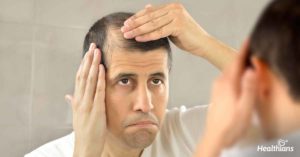Contributed by – Healthians Team
Hair loss can be scary; sometimes depressing too!
Hair fall is quite common and can occur due to various reasons. But the best part is that, if you find the exact cause, you can get the right treatment. Hair loss is not just about looks. Most causes of hair loss are related to your health, so you need to identify the root cause. Timely medical advice and necessary investigations can help in treating hair fall.
What Causes Hair Fall?
People often complain of their hair falling out in the shower or while combing. Though it can be a harrowing experience for those who live with it everyday, what is important is to know what is causing hair fall. Listed here are the possible causes of hair loss, their symptoms and related tests.
Hereditary Hair Loss
This is one of the commonest causes of hair loss, which is due to your genes. In hereditary hair loss, you may also see your parents or siblings having similar problems.
Women may experience thinning of hair, which gradually continues with aging. Men may show loss of hair in certain areas, typically resembling those of your father or brother. This condition is best detected by a dermatologist. Blood tests to rule out medical causes or autoimmune conditions and examination of the hair loss pattern or baldness is done. In some cases, a scalp biopsy may be required to confirm the diagnosis.
Skin Conditions of the Scalp
Skin conditions, dandruff, and fungal infections of the scalp are common causes of hair fall. People with an unhealthy scalp may also have an unhealthy, sensitive skin.
Common symptoms include itching scalp, which sheds flakes. Scales often fall off on shoulders and are easily noticeable. Depending on the type of infection, thick white, yellowish or red patches may be seen on the scalp. Skin infections of the scalp can be normally noticed during scalp examination. However, culture test to detect the infection and scalp biopsy can help reveal the exact condition.
Excessive Styling
Have you thought about your styling products? Yes, they are harmful too.These days young people use curling irons, hair pressing, blow drying, excessive styling, hair colouring, etc. These processes use heat and many chemicals that weaken your hair. This causes hair fall. While it is common for both men and women, people with a sensitive skin and scalp, experience more problems.
Hair loss due to excessive styling is often seen as hair that easily breaks and not falls off with the bulb at their bases. This is the most commonly used sign to detect hair loss caused by styling and harsh hair-care products. Investigations may be done as advised, which can include allergy tests as well.
Hypothyroidism
In hypothyroidism, reduced thyroid hormones cause several health problems including hair loss, more commonly in women. As thyroid hormone mainly controls metabolism, reduced hormones affect hair growth and skin quality.
The symptoms of hair fall due to hypothyroidism include brittle nails and skin, easily falling hair and dry skin and hair. Other symptoms of hypothyroidism include fatigue, weight gain, gastric disturbances, weak muscles, depression and difficulty in concentration.
In some cases, hyperthyroidism, which is increased thyroid hormone too can affect your hair. This is due to increased metabolism, which can cause excessive thinning of hair.
In any case, thyroid problems can be detected with blood tests, called thyroid profile, which measures thyroid hormone levels. Accordingly, your doctor may prescribe appropriate medications. Once thyroid hormone levels are controlled, thyroid hair loss begins to improve.

Iron Deficiency Anaemia
Iron deficiency anaemia too can cause hair fall. It is more common in women who have menstrual abnormalities, heavy periods or long term iron deficiency. Iron is essential for better blood circulation and oxygenation throughout the body.
Common symptoms of iron deficiency anaemia are weakness, pale skin, eyes and skin, frequent headaches, fainting and hair loss. It can be detected with a blood test to find the haemoglobin levels and details of red blood cells in complete blood count (CBC).
Hormonal Imbalance
Hormonal imbalances are a rising cause of hair fall in women. Problems related to hormonal imbalance affect women during puberty, adulthood and also during menopause.
- Women experience hair loss during menopause, along with hot flashes, night sweats, burning in palms and feet and increased irritability.
- Conditions like polycystic ovarian syndrome (PCOS) present with cysts in ovaries, irregular periods, hair growth on the face and can also affect fertility. This is a common cause of hair fall and also contributes to other skin problems in some women.
In men too, hormonal imbalance can occur due to various causes. Male menopause, known as andropause causes decreased production of testosterone hormone, which can cause hair loss. Blood tests can detect hormone levels, while PCOS can be confirmed with scans.
Pregnancy and Lactation
Pregnancy and lactation is a period when there is an excessive shedding of hair, which is why many women experience hair fall. This is also influenced by hormone changes after delivery. But the condition is mostly temporary and hair growth resumes after few months.
Skin and hair tests may be advised, with blood tests to detect nutritional deficiencies and rule out other conditions.
Vitamin B12 deficiency
Lack of vitamin B12 can cause hair loss, more prevalent in women. Symptoms of vitamin B12 deficiency include weakness, lack of energy, palpitations, tingling in hands and feet and hair fall. It can be detected with a blood test to find vitamin B12 level.
Stress is also known to cause hair loss. People experiencing post-traumatic stress disorder, after injuries or accidents can have hair loss. Hair fall is common during recovery from infections or illnesses. Your hair fall can also be related to skin problems, autoimmune disorders, disorders of the glands and certain types of medicines or treatments. Seek medical opinion to find the right cause. Appropriate investigations and treatment can control your hair fall.
Apart from beauty, your hair speaks a lot about your health. If you love your hair, start with taking care of your health.






